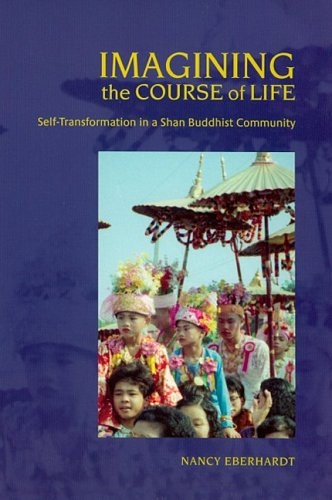Imagining the Course of Life: Self-Transformation in a Shan Buddhist Community
- About the Book
-
Imagining the Course of Life offers a rich portrait of rural life in contemporary Southeast Asia and an accessible introduction to the complexities of Theravada Buddhism as it is actually lived and experienced. It is both an ethnography of indigenous views of human development and a theoretical consideration of how any ethnopsychology is embedded in society and culture. Drawing on long-term fieldwork in a Shan village in northern Thailand, Nancy Eberhardt illustrates how indigenous theories of the life course are connected to local constructions of self and personhood. In the process, she draws our attention to contrasting models in the Euro-American tradition and invites us to reconsider how we think about the trajectory of a human life.
Moving beyond the entrenched categories that can hamper our understanding of other views, Imagining the Course of Life demonstrates the real-life connections between the “religious” and the “psychological.” Eberhardt shows how such beliefs and practices are used, sometimes strategically, in people’s constructions of themselves, in their interpretations of others’ behavior, and in their attempts at social positioning. Individual chapters explore Shan ideas about the overall course of human development, from infancy to old age and beyond, and show how these ideas inform people’s understanding of personhood and maturity, gender and social inequality, illness and well-being, emotions and mental health.
- About the Author(s)
-
Nancy Eberhardt, Author
Nancy Eberhardt is professor of anthropology at Knox College in Galesburg, Illinois.
- Reviews and Endorsements
-
- An exemplary work of modern American cultural anthropology: engagingly written, theoretically informed (but not at the expense of ethnographic reportage), sufficiently autobiographical (but without tedious self-flagellation) and, above all, exquisitely well documented with field-based observations. . . . This publication will delight Southeast Asianists, scholars of lay Buddhism, and students . . . of the socioculturally complex lands of northern mainland Southeast Asia.
—Asian Anthropology - Eberhardt’s study in Thailand helps correct a paradoxical absence of studies in child development, self and life course in mainland Southeast Asian studies. And it offers a gem of a book to engage undergraduates’ interest and imagination.
—Ethos: Journal of the Society for Psychological Anthropology - Nancy Eberhardt’s study of a Shan village in northwest Thailand analyzes religion, worldview, ritual, and customary practices as strategies for identity construction and for insight into Shan theories of human development and human nature. It is a marvelous explication of the dialectic between cultural forms and personal interpretations and makes a unique contribution to the field of ethnopsychology.
—Donald K. Swearer, Harvard Divinity School, Harvard University - This is a splendid book about how some Shan people deal with human life stages in thought, word, and action. These villagers are not sophisticated theologians, just ordinary people working their way through life’s problems. Through them, Eberhardt offers a superb portrayal of how Buddhist ideas of merit, karma, and reincarnation are actually understood and acted on. The book is a joy to read, treating complex matters in a way that will hold the interest of generalists and students even as it informs the specialist.
—Karl G. Heider, University of South Carolina - Imagining the Course of Life is a delightful, moving ethnography. It is exceptionally well written and highly engaging in style and content. Nancy Eberhardt makes a valuable contribution to both Southeast Asian studies and to wider debates in ethnopsychology and human development. Moreover, she does so in a way that is unusually readable and accessible to multiple audiences.
—Mary Beth Mills, Colby College
- An exemplary work of modern American cultural anthropology: engagingly written, theoretically informed (but not at the expense of ethnographic reportage), sufficiently autobiographical (but without tedious self-flagellation) and, above all, exquisitely well documented with field-based observations. . . . This publication will delight Southeast Asianists, scholars of lay Buddhism, and students . . . of the socioculturally complex lands of northern mainland Southeast Asia.
- Supporting Resources
-





